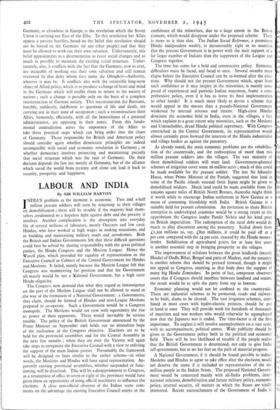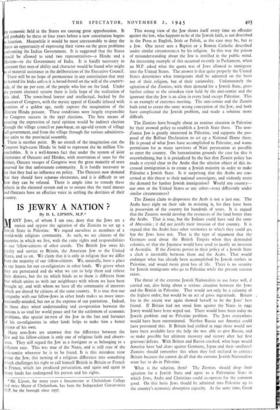LABOUR AND INDIA
By SIR WILLIAM BARTON
INDIA'S problem at the moment is economic. Two and a-half million peasant soldiers will soon be returning to their villages on demobilisation ; there will be trouble if the majority find them- selves condemned to a hopeless fight against debt and the poverty it involves. Another complication is the absorption into everyday life of several millions of labourers, mostly Outcasts and low caste Hindus, who have worked at high wages in making munitions, and in building and maintaining military roads and aerodromes. Both the British and Indian Governments felt that these difficult questions could best be solved by sharing responsibility with the great political parties, the Hindu Congress and the Moslem League. Hence the Wavell _plan, which provided for equality of representation in the Executive Council or Cabinet of the Central Government for Hindus and Moslems. It failed, mainly because the Moslem League felt that Congress was manoeuvring for position and that the Government ult mately would be not a National Government, but a high caste Hindu oligarchy.
The Congress now demand that what they regard as intransigence on the part of the Moslem League shall not be allowed to stand in .the way of the formation of a National Government : a Government, they claim, should be formed of Hindus and non-League Moslems prepared to co-operate. Such a Government would be a Congress monopoly. The Moslems would not view with equanimity the rise to power of their opponents. There would inevitably be serious trouble. The policy of the British Government announced by the Prime Minister on September 19th holds out no immediate hope of the realisation of the Congress objective. Elections are to be held for the provincial assemblies and for the Central Assembly in the next few months ; when they are over the Viceroy will again take steps to reorganise the Executive Council with a view to enlisting the support of the main Indian parties. Presumably the framework will be designed on lines similar to the earlier scheme—in other words, the Moslems and Hindus will have equal representation. Ap- parently existing provincial assemblies, whether suspended or func- tioning, will be dissolved. This will be a disappointment to Congress, as a resumption of office in seven or eight of the provinces would have given them an opportunity of using official machinery to influence the elections. A close non-official observer of the Indian scene com- ments on the advantage the existing Executive Council enjoys in the
confidence of the minorities, due to a large extent to the British element, which would disappear under the proposed scheme. There is more to it than that. The Indian Social Reformer, a prominent Hindu independent weekly, is incontestably right in its assertion that the present Government is in power with the tacit support of a far larger number of Indians than the supporters of the League and Congress together.
The time has come for a bold and constructive policy. Economic difficulties must be faced, and faced at once. Several months must elapse before the Executive Council can be re-formed after the elec- tions. Why should not the present Government which, apart from such confidence as it may inspire in the minorities, is mainly com- posed of experienced and patriotic Indian statesmen, frame a com- prehensive policy, even if it has to leave its final implementation to other hands? It is much more likely to devise a scheme that would appeal to the masses than a pseudo-National Government weakened by internal stresses and strains. High-caste Hindus dominate the economic field in India, even in the villages, a fact which explains to a great extent why minorities, such as the Moslems and Untouchables, dread Hindu political supremacy. With Congress entrenched in the Central Government, its representatives would almost certainly press forward the interests of the Hindu industrialist and village banker as against the peasantry.
As already noted, the main economic problems are the rehabilita- tion of the countryside, and the reabsorption of more than two million peasant soldiers into the villages. The vast majority of these demobilised soldiers will want land. Government-planned schemes of irrigation cover some 16 million acres ; much of this could be made available for the peasant soldier. The late Sir Sikandar Hayat, when Prime Minister of the Panjab, suggested that land in some of the Pacific islands rescued from Japan might be given to demobilised soldiers. Much land could be made available from the too,000 square miles of British North Borneo, Australia might think it worth while to encourage Indian settlement in New Guinea as a mean of cementing friendship with India. British Guiana is a suitable field for peasant colonisation. An invitation to share British enterprise in undeveloped countries would be a strong retort to the opprobrium the Congress leader Pandit Nehru and his kind pour on British imperialism. The redemption of the rural debt would do much to allay discontent among the peasantry. Scaled down from £1,300 millions to, say, £800 millions, it could be paid off at 4 per cent. compared with the 24 per cent. exacted by the Hindu money- lender. Stabilisation of agricultural prices for at least five years is another essential step in bringing prosperity to the villages.
The improvement of relations between the great landlords (mostly Hindu) of Oudh, Bihar, Bengal' and parts of Madras, and the tenantry is another reform that should be pressed forward, though it might not appeal to Congress, enjoying as that body does the support of many big Hindu Zemindars. In point of fact, competent observers assert that if Congress should interfere between landlord and tenant, the result would be to split the party from top to bottom.
Economic planning would not be confined to the countryside. There are industrial schemes to be promoted, roads and railways to be built, slums to be cleared. The vast irrigation schemes, com- bined in most cases with hydro-electric projects, should be put in hand at once They will provide work for hundreds of thousands of munition and war workers who would otherwise be unemployed now that the Japanese war is ended. The time-factor is of the first importance. To neglect it will involve unemployment on a vast scale, with its accompaniment, political unrest. Wide publicity should be given to the Government policy both in the political and economic field. There will be less likelihood of trouble if the people realise that the British Government is determined, not only to give India self-government, but to set her feet on the path of material progress.
A National Government, if it should be found possible to induce Moslems and Hindus to agree to take office after the elections would not deserve the name if it included no representatives of the too million people in the Indian States. The proposed National Govern- ment would be concerned mainly with all-India problems, inter- national relations, demobilisation and future military policy, economic policy, internal security, all matters in which the States are vitally interested. Recent encroachments of the Government of India in economic field in the States are causing great apprehension. It probably be three or four years before a new constitution begins o function. Meanwhile it would be most unreasonable to deny the tates an opportunity of expressing their views on the great problems onfronting the Indian Government. It is suggested that the States hould be allowed to send two representatives—a Hindu and a oslem—to the Government of India. It is hardly necessary to omment that men of ability and character would be found who might of material assistance in the deliberations of the Executive Council. There will be no hope of permanence in any constitution that may e framed for India unless it is broad-based on the will of the country- ide, of the 90 per cent. of the people who live on the land. Under e present electoral system there is little hope of the realisation of his ideal. The town-bred lawyer and intellectual, backed by the esources of Congress, with the mystic appeal of Gandhi infused with romises of a golden age, easily capture the imagination of the 'literate Hindu peasant. These conditions were largely responsible or Congress success in the 1937 elections. The best means of nsuring the expression of rural opinion would be indirect election rough the village council or panchayat, an age-old system of village If-government, and from the village through the various administra- ve units to the provincial assembly.
There is another point. By no stretch of the imagination can the ngress high-caste Hindu be held to represent the 6o million Un- ouchables. It is a well-known fact that under the system of joint ectorates of Outcasts and Hindus, with reservation of seats for the miner, Outcast stooges of Congress won the great majority of seats eserved for that unfortunate community. It is hardly necessary to y that they had no influence on policy. The Outcasts now demand at they should have separate electorates, and it is difficult to see ow they can be refused. There is ample time to remedy these elects in the electoral system and so to ensure that the rural masses d Outcasts have an effective voice in settling the destinies of their ountry.































 Previous page
Previous page